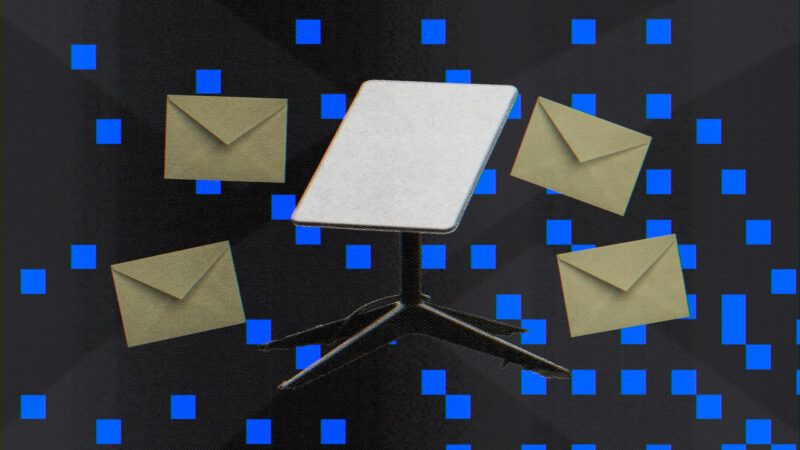Starlink Election Fraud Claims Show Dems Are Not Immune to Conspiracy Theories
The spread of conspiracy theories in response to a bruising electoral loss is not only found on the political right.

After the 2020 election, then-President Donald Trump and his allies floated numerous hypotheses to explain his loss. One theory, which came to be known as "Italygate," posited that Italian military satellites had interfered with American voting machines and switched votes from Trump to Joe Biden. Though far-fetched, multiple government agents looked into it: Acting Secretary of Defense Christopher Miller called U.S. officials in Rome to ask about the theory, and then-White House Chief of Staff Mark Meadows emailed Acting Attorney General Jeffrey Rosen, asking him to investigate.
Like all of Trump's other allegations about voter fraud in 2020, Italygate had no basis in reality. But just one election cycle later, on the opposite side of the aisle, a very similar conspiracy is taking shape.
"Swing states were able to use Starlink in order to tally up and to count ballot votes, or voting ballots, in their state," claimed TikTok user Etheria77 in a video that was also cross-posted to X last week, where as of this writing it has more than 4.5 million views. (TikTok removed the original video.) Over the course of the nine-minute video, Etheria77 posits that Elon Musk sent Starlink satellite internet terminals to swing states for use with vote tabulation, a task the terminals are not equipped to perform.
"There [are] absolutely zero reasons as to why those systems were connected to the internet," Etheria77 says. "[Voting] machines have absolutely no problem tallying up votes like they have done since the beginning of time."
To be sure, one TikTok video filmed in the front seat of a car is hardly the same as a concerted effort encompassing the sitting president. But the allegation has spread so far and wide that multiple mainstream news outlets felt the need to address it.
As with Italygate, this theory is not based in fact. While Starlink terminals "were used by election officials in some states to improve internet connectivity at rural polling locations," Alex Demas wrote at The Bulwark, "Starlink is not a tabulation system and was not used to count or transmit votes in the swing states." Terminals were largely used at polling places that rely on steady internet connections to perform tasks like checking voters' signatures and registration.
The Associated Press wrote in October that "with a few exceptions," voting machines are not connected to the internet: "There are some jurisdictions in a few states that allow for ballot scanners in polling locations to transmit unofficial results, using a mobile private network, after voting has ended on Election Day and the memory cards containing the vote tallies have been removed."
"It is not possible that Starlink was used to hack or change the outcome of the US presidential election," David Becker of The Center for Election Innovation & Research told the AP.
"Our elections produce huge quantities of physical evidence. A satellite system like Starlink cannot steal that," Pamela Smith of the nonprofit Verified Voting Foundation told Demas.
In a sense, Musk makes an obvious boogeyman for progressives: Not only did he spend more than $100 million helping elect Trump, but he has engaged in plenty of conspiracy theorizing of his own. (In the final month of the campaign, Musk even promoted the long-debunked theory that Dominion voting machines switched votes in 2020.)
Still, there remains no evidence of any sort of widespread electoral malfeasance, by Starlink or otherwise. But that doesn't mean that conspiracy theories haven't run wild.
"What began as vague, amorphous claims that 'something doesn't add up' in the hours after president-elect Donald Trump won the election last week have now crystallized into an evolving conspiracy theory involving Musk and Starlink," WIRED's David Gilbert wrote on Thursday. In an article last week, tech reporter Taylor Lorenz noted that "Over the past several days, Meta's Threads has become inundated with liberal election fraud conspiracies."
"Why was Starlink allowed to count our votes when it's owner Elon Musk paid people a million dollars to vote for Donald Trump?" asked one X user, in a post that has been seen 1.8 million times.
"Musk's Starlink uploaded votes in swing states," political commentator and former George Washington University adjunct professor Cheri Jacobus posted on Threads. "Swing state voters went Dem downballot but Trump at the top? [Unlikely]."
To be clear, this is not to say that a mélange of social media posts alleging fraud is equivalent to the situation in 2020, when the sitting president and his staff wielded the power and influence of the federal government to allege—without evidence—that the election had been stolen. (Unlike Trump, Harris conceded defeat, and Biden invited him to the White House as the election winner.)
But it does indicate that the spread of conspiracy theories in response to a bruising electoral loss is not only found on the political right. Rather, it seems that plenty of people, regardless their political persuasion, are susceptible to being taken in by desperate attempts to explain or rationalize an unwelcome result.


Show Comments (42)